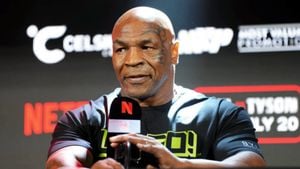Stephen Flynn, the Westminster leader of the Scottish National Party (SNP), is stirring the pot as he eyes the Holyrood elections scheduled for 2026. The Aberdeen South MP has thrown his hat in the ring for the Aberdeenshire South and North Kincardine seat, currently held by fellow SNP member Audrey Nicoll. While his political aspirations could promise exciting developments for SNP supporters, Flynn's announcement has provoked some mixed reactions within his party.
Last week, Flynn made waves by declaring his intention to contest Nicoll's seat, igniting internal discord among SNP ranks. Expressing his sentiments on the matter, Flynn remarked, "None of this is particularly edifying for anyone." This statement clearly reflects his disappointment with the ensuing party infighting, which he feels could distract from more significant concerns for the party and its constituents. He also emphasized his commitment to hold onto his Westminster seat until the next general election, which is expected to take place by 2029—a move many are watching closely.
Interestingly, Flynn has made it clear he won’t accept two salaries from both posts, signaling his integrity and willingness to adhere to typical parliamentary norms, as well as alleviating some concerns surrounding dual mandates.
This infighting within the SNP took a spotlight after his announcement appeared to unsettle some party officials, potentially prompting discussions on dual jobholders. Many recall how the SNP modified its internal rules before the 2021 election to require MPs to resign their Westminster seat to qualify for selection for Holyrood, which signaled their seriousness about establishing clearer separations between roles.
During Flynn's interview on BBC Scotland's The Sunday Show, he expressed his frustration, stating, "I'm not going to shy away, I'm not going to be hounded out from standing for what I believe in." This shows his determination to pursue his political plans, no matter the fallout. He acknowledged the complexity of political dynamics, saying, "It’s not pleasant," adding weight to the emotional toll it takes when members vie for related but separate positions.
Rumors also suggest tension surrounding his relationship with Nicoll, particularly after he disclosed his plans to her. According to Flynn, their conversation was amicable and cordial, dismissing any notion of coercion. He said, "No, she wasn't angry," as Nicoll reportedly shared she was not overly shocked by his intentions. Yet, sources close to Nicoll imply she sensed some pressure, hinting at what might have been interpreted as Flynn wanting her to step aside—a claim Flynn firmly rebuts.
Adding to the backdrop of this internal drama, Nicoll's husband, Alex Nicoll, recently quit the party, apparently motivated by dissatisfaction with the party's local decisions, which likely makes the environment at SNP even more charged and complex.
Flynn’s aspirations come at the time when the party undergoes scrutiny over its dual mandate rules. John Swinney, the current First Minister, acknowledged the absence of decisions surrounding the possibility of dual roles, emphasizing the importance of evaluating these matters thoroughly. His experience with dual mandates adds another layer of authenticity to discussions on this topic, as he serves as both Holyrood and Westminster MP early on during devolution.
The upcoming elections will also reflect on how effective the SNP has been under leadership changes and internal challenges. Flynn himself has garnered attention not only for his ambitions but also as someone who could emerge as one of the influential figures within the party, perhaps even as its future leader—though he downplayed the possibility of any leadership contest imminent to follow Swinney, saying it would happen long down the line.
Despite all the distractions, Flynn has aspirations to focus on the task at hand. He aims to secure the Holyrood position without causing unnecessary upheaval or triggering costly by-elections, which could throw the party's strategic objectives off course. His insistence on not participating on both fronts concurrently indicates strategic awareness.
This bid has also raised eyebrows, particularly from opposition parties, who are watching closely for any missteps. Addressing the party's recent criticism of former Scottish Conservative leader Douglas Ross, Flynn jokes playfully about Ross juggling too many work commitments at once, a teasing reminder of the consequential expectations for politicians who dare to balance multiple responsibilities.
While the SNP grapples with Flynn’s ambitions and the underlying tensions, the party remains committed to tackling its internal issues, mainly focusing on revitalizing its image among the public and voters amid external challenges. Importantly, Flynn's determination is evident: he is not one to shrink from necessary fights nor to shy away from advocating for his political beliefs. Observers will be eager to see how this internal skirmish evolves as the clock ticks down to the 2026 elections.
Whatever the outcome, it becomes apparent from Flynn’s recent engagement and response to challenges, his political career is far from static. With his ambitions and clear engagement strategy, he embodies the qualities of resilience and perseverance, no doubt echoing sentiments shared broadly across the political spectrum as voters seek representatives who are not afraid to take the initiative even when faced with adversity.



